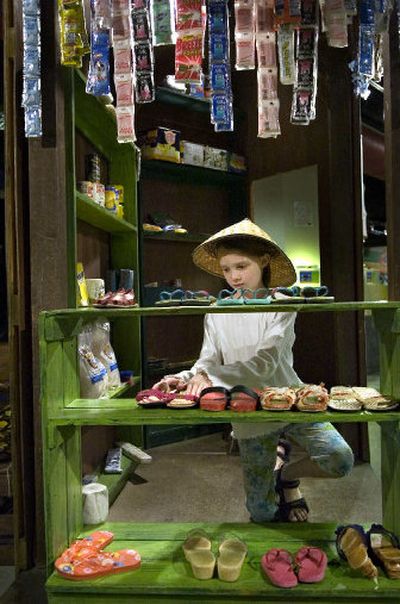Science center plan near

A long-sought science center for the north bank of the Spokane River is moving toward a critical Park Board vote this spring, but City Hall support for the project may be waning because the timetable for construction has been pushed back.
Spokane voters in 1999 approved a bond issue that, in part, authorized the purchase of 5.7 acres of a former dairy site for construction of a science center as an educational asset to capture kids’ imaginations.
Mobius, a local nonprofit organization selected to develop and operate the science center, won a long-term lease for the project in 2003 from the Spokane Park Board. But that lease was contingent on Park Board acceptance of a business and capital campaign plan.
Initially, the Park Board set a one-year deadline, but the deadline was pushed back to give Mobius more time. Now, two years after the initial deadline, Mobius is ready to give details of the plan and is expected to ask the Park Board for the needed approval to move ahead. A Park Board vote could come as early as next month.
But the delay in finishing the plan is raising concerns at City Hall about the soundness of the project.
“I just don’t think they have it lined out,” said Councilman Bob Apple, who serves as the council’s liaison to the Park Board. He said that Mobius has raised little money beyond a $1.5 million appropriation from the Legislature to pay for design work.
The state money would not be spent until the Park Board approves the plan and gives the go-ahead for the $33 million science center.
Gage Stromberg, executive director of Mobius, acknowledged that concerns are being raised behind the scenes, but said Mobius spent the extra time on the planning to make sure the project pencils out.
“It’s taken more time than we thought on the front end,” Stromberg said this week. “From our perspective, we’re on a positive track.”
Several Park Board members, including Apple, heard details of the plan in a private meeting this week. A public release could come Monday.
“We’ve done the homework. We’ve got the plan. Let’s have a public conversation about it,” Stromberg said. “If we get the Park Board support, we’re ready to move ahead.”
McDonough & Partners, of Charlottesville, Va., an architectural firm with a national reputation for building environmentally sustainable buildings, has been chosen to guide the conceptual design. The firm would coordinate the work with Spokane-based Integrus Architecture.
The size of the facility would be reduced from an original proposal of 100,000 square feet to a current proposal of 78,000 square feet, including a new IMAX theater. The smaller space saves $3 million over the earlier proposal, even after inflationary increases in construction costs are counted.
If the Park Board approves the plan, then Mobius would begin a fundraising campaign over the next three-plus years leading to a proposed start of construction in 2009 with completion by 2010 or 2011. Several large donations have already been lined up, but not announced.
Work would start only after 80 percent of the funding is obtained. Mobius is expected to seek another appropriation from the Legislature of $6.5 million for construction, and there is a possibility of receiving federal grants.
Apple said he is mainly concerned that Mobius may not be able to raise up to $25 million from local businesses and individuals, much less win another legislative appropriation. He said discussion of the science center on the north bank dates back nine years, and completion could take five years or more.
The city spent $3.5 million from its 1999 park bond issue to buy land just north of Riverfront Park along Cataldo Avenue. Parks officials then spent $310,000 soliciting public input on a master plan. In 2001, the parks department sought private bids on developing and operating the center.
Parks officials have consistently said they want a self-supporting operation that will not need a city subsidy at a time when tax-supported services are under tight budgets.
An earlier Spokane nonprofit known as the Inland Northwest Science & Technology Center submitted the only bid to build and operate the facility. That organization merged with the former Children’s Museum of Spokane in early 2005 to become Mobius. Last September, Mobius opened its Mobius Kids center in the downstairs level of River Park Square.
So far, Mobius Kids has drawn 45,000 visitors and signed up 2,000 families as members, both of which were higher than initial expectations.
City leaders have long sought a privately operated facility in Riverfront Park, in part to draw more visitors to the downtown area.
Leisure and Recreation Concepts Inc. of Dallas offered to spend $10 million for an amusement center in the 1980s and Pacific Science Center of Seattle would have spent an equal amount in the 1990s, but both projects were killed by citizen opposition. To get around objections over development in the heart of the park, proponents of a science center pushed the idea of buying land on the north bank adjacent to Riverfront Park.
The center would be named Mobius at Michael P. Anderson Plaza in honor of Lt. Col. Anderson, the astronaut and Cheney High School graduate who died in the Columbia space shuttle accident on Feb. 1, 2003.